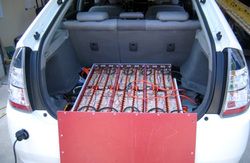|
By accessing or using The Crittenden Automotive Library™/CarsAndRacingStuff.com, you signify your agreement with the Terms of Use on our Legal Information page. Our Privacy Policy is also available there. |

EV Batteries - Is There Life After Death?
|
|---|
|
|
EV Batteries - Is There Life After Death?
Geoff Maxted
DriveWrite
September 10, 2013
The take-up of electric cars has no doubt disappointed both manufacturers and the green lobby. DriveWrite had a chance to drive the Renault Zoë a while back and found it excellent but, like many other interested spectators, can’t get past the range issue for general use. What has perhaps been less considered is what to do with the motor batteries after use. It seems that after about eight to ten years their power dwindles with the obvious adverse effect on the car’s performance.
As far as buyers are concerned Renault are considering the battery leasing route which is an option for both private and fleet users but the batteries will still wear out - so what to do with them?
Well, a new project is setting out to find a way to realise value from the worn out batteries in electric vehicles. Based in the North East of England, the project is looking at using the old EV batteries as energy storage in a domestic or workplaces, either for charging vehicles, providing an emergency power source or feeding power back into the grid.
A spokesperson said, "Although the performance of lithium ion batteries used in EVs dwindles in their original application after eight to 10 years, they maintain around 80 percent of their operational capability, and the challenge is to successfully harness this potential. The project has developed a multi-functional demonstrator unit that can store power from photovoltaic (PV) panels to power the home, charge EVs, feed back into the grid or help manage your power supply to minimize exposure to peak tariffs. The system can also be charged from the grid itself, making it a truly multi-purpose energy storage tool." Sounds like a brilliant idea.
The thinking is that, over time, it will help reduce the overall cost of EVs and battery hire, as battery life can be extended by three-times that of its first in-car usage. This is a great idea and, it would seem, a viable solution to the disposal of older units or at least get a meaningful lifespan out of them. Obviously, they have still got to be charged from the mains but as an alternative emergency power source, it makes sense.



















